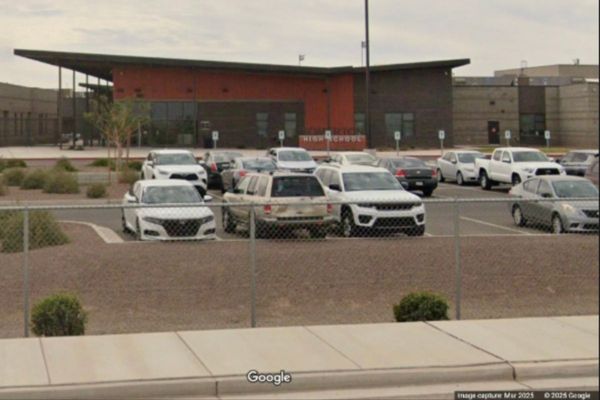
Iran has said it would hold talks with the United States over its nuclear programme, confirming an earlier announcement by President Donald Trump.
Iranian Foreign Minister Abbas Araghchi wrote on social media late on Monday that “indirect” talks would take place on Saturday. Iranian state media later reported that Araghchi would meet the US envoy to the Middle East, Steve Witkoff, with Oman acting as a mediator.
Earlier, Trump had announced the start of “direct” talks, while maintaining threatening rhetoric suggesting the US could attack Iran. Tehran had earlier dismissed Washington’s calls for the talks.
“We’re having direct talks with Iran, and they’ve started. It’ll go on Saturday. We have a very big meeting, and we’ll see what can happen,” Trump told reporters at the White House on Monday, alongside Israeli Prime Minister Benjamin Netanyahu.
“And I think everybody agrees that doing a deal would be preferable,” he added, without providing further details.
Trump also warned that Iran would be in “great danger” if diplomatic efforts to curb its nuclear ambitions failed, adding that Tehran “can’t have nuclear weapons”.
Earlier this month, Trump told NBC News: “If they [Iran] don’t make a deal, there will be bombing.”
He added that the bombing would be “the likes of which they have never seen before”.
Trump’s announcement of direct talks with Tehran would not be to Netanyahu’s “liking”, as the Israeli leader has long wanted to simply bomb Iran, said Marwan Bishara, Al Jazeera’s senior political analyst.
“Trump has wanted a deal for a long time,” Bishara said. However, “Netanyahu certainly thinks Iran’s defences have been weakened by last year’s Israeli air strikes on Iran. And he sees this as a great opportunity, with US support, for Israel to finish off Iran.”
“In reality, Trump doesn’t want to enter a war with Iran while he is in the midst of trade wars with the rest of the world,” Bishara added.
‘Meaningless talks’
Trump said last month in a letter to Iran’s Supreme Leader Ayatollah Ali Khamenei that he hoped there would be a negotiation between the countries.
Over the weekend, Araghchi had described the prospect of direct talks as “meaningless”.
Tehran, which maintains that it is not seeking a nuclear weapon, has rejected Washington’s push to enter direct negotiations but has previously said it is open to indirect diplomacy.
Iranian media reported on Tuesday that Oman’s Foreign Minister Badr Albusaidi will act as a mediator in the talks. Oman has long acted as a communication channel between the US and Iran.
It also played a crucial role in the signing of the 2015 nuclear agreement between Iran and world powers which placed strict curbs on Tehran’s nuclear activities in exchange for sanctions relief. Trump withdrew from that deal in 2018.
Nournews, affiliated with Iran’s top security body, described Trump’s claim that direct talks were planned as part of a “psychological operation aimed at influencing domestic and international public opinion”.
China, which hosted talks with Iran and Russia over the issue this week, was quick following Tehran’s confirmation to urge Washington to show “sincerity”.
“As the country that unilaterally withdrew from the comprehensive agreement on the Iran nuclear issue and caused the current situation, the US should demonstrate political sincerity [and] … mutual respect,” Ministry of Foreign Affairs spokesperson Lin Jian said.
Iran says its nuclear activities are solely for civilian purposes. Israel, the US’s top ally in the region, is widely believed to have an undeclared nuclear arsenal.
Netanyahu calls for Palestinians to leave Gaza
Speaking next to Netanyahu, who has been issued an arrest warrant by the International Criminal Court (ICC) for alleged war crimes in Gaza, Trump suggested that the war in the Palestinian enclave could end soon.
“I’d like to see the war stop, and I think the war will stop at some point that won’t be in the too-distant future,” Trump told reporters in the Oval Office. However, he did not provide specifics on how or when a ceasefire might be reached.
Netanyahu claimed that Israel was working on a new agreement following January’s temporary ceasefire, which he broke unilaterally in March before unleashing more bombing on Gaza and killing hundreds more Palestinians.
“We’re committed to getting all the hostages out, but also eliminating the evil tyranny of Hamas in Gaza and enabling the people of Gaza to freely make a choice to go wherever they want,” he said.
The Israeli leader also said he had discussed with Trump what he called the US president’s “bold vision” for Gaza, referring to a controversial proposal for US control over the enclave.
The plan, widely condemned as a blueprint for ethnic cleansing, has drawn sharp criticism internationally.
Luciano Zaccara, assistant professor in Gulf politics at Qatar University, said the comments did not reveal any change in policy towards Gaza.
“Both share the belief that fewer people in Gaza is better – for the United States and Israel,” Zaccara told Al Jazeera.
The word “ceasefire” barely came up in the media conference, said Zaccara, adding, “Trump’s main focus was business, trade deficits, and corporate deals, including with Israel. He was not paying much attention to Gaza as a whole, except when discussing expelling Palestinians from their land.”
US looks to mediate between Turkiye and Israel
Turning to Syria, Trump positioned himself as a potential mediator between Israel and Turkiye, despite tensions between Netanyahu and Turkish President Recep Tayyip Erdogan.
“Any problem that you have with Turkey, I think we can solve, as long as you are reasonable,” Trump told Netanyahu.
“I have a very, very good relationship with Turkey and with their leader, and I think we’ll be able to work it out. So I hope that’s not going to be a problem. I don’t think it will be a problem,” added Trump.
Trump, who described Erdogan as “very smart”, praised Turkiye’s role in Syria, referring to the overthrow of leader Bashar al-Assad in December. “Nobody has done in 2,000 years what Turkey has done in Syria,” he said.
Israel, which has carried out extensive air attacks against Syrian military targets, remains wary of Turkiye’s growing influence in Syria.
Israeli officials fear that a permanent Turkish military presence in Syria could limit their operational freedom to attack Syria.







